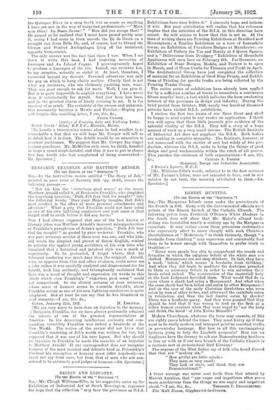BENJAMIN FRANKLIN AND MATTHEW ARNOLD. (To THE Eprroa OF THE
" SPECTATOR.") SIR,—In the instructive review entitled " The Story of Job," printed in your issue of January 14th (pp. 50-51), occurs the following passage :-
" Not for him the victorious good sense,' as the ironic
Matthew Arnold called it, of Benjamin Franklin, who simplified the searching question, Doth Job fear God for nought?' into the following words, 'Does your Majesty imagine that Job's good conduct is the effect of mere personal attachment and affection?' What a pity that Franklin could not have acted as one of his own lightning conductors and sent some of that turgid stuff to earth before it did any harm."
Now I had always supposed that one of the best known of literary jokes was Matthew Arnold's innocent misapprehension of Franklin's paraphrase of Satan's question, " Doth Job fear God for nought? " as quoted by your reviewer. Franklin, who was purl sermonis amator if there ever was one, and who him- self wrote the simplest and purest of Seven English, wished to satirize the upstart young scribblers of his own time who imagined that a Latinized and involved style was a mark of superiority. So he pretended, I forget where, that his laboured rendering was much finer than the original. Arnold, who, as appears from this and other evidence, could never see a joke unless it was carefully analysed and diagrammed for his benefit, took him seriously, and triumphantly exclaimed that here was a mood of thought and expression (or words to this Elfect) which even Franklin's " victorious good sense " could not comprehend. So the clumsy sarcasm of your reviewer, whose sense of humour seems to resemble Arnold's, about Franklin acting as one of his own lightning conductors is quite misplaced. But at least he can say that he has blundered in pod company.—I am, Sir, &c., [We are very sorry to have done an injustice to the memory ,1 Benjamin Franklin, for we have always profoundly admired the talents of one of the greatest representatives of America. In his devouring intellectual curiosity and com- manding versatility Franklin was indeed a Leonardo of the New Worid. The writer of the review did not know that Franklin's rendering of Job's words was written for fun, but supposed that it was one of his rare lapses. But why should an injustice to Franklin be made the occasion of an injustice to Matthew Arnold? If our correspondent does not recognize humour of the most ironical and delicate kind in Friendship's Garland his conception of humour must differ hopelessly—we must not say from ours, but from that of men who are con- sidered to be extremely good judges of humour.—En. Spectator.]


































 Previous page
Previous page